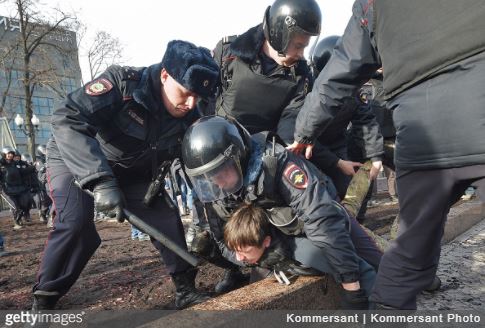
On March 26th, thousands of Russians took to the streets for anti-corruption demonstrations which demanded the resignation of Prime Minister Dmitry Medvedev. Clashes between protesters and police occurred in a number of cities across Russia; hundreds of protesters were detained by authorities.
The anti-Kremlin marches were the largest since the 2011-2012. In Moscow alone, 8,000 people were reported to have taken part in the unauthorized marches. The sheer amount of people protesting led to violent scenes when riot police confronted protesters. The reported number of arrested protesters varied from 500-700 in Moscow, and dozens of other cities around Russia. The opposition leader Alexei Navalny called for the protests by publishing sensitive information about Dmitry Medvedev, which accused the Prime Minister of severe corruption. Navalny was also detained after taking part in the Moscow marches. The protests occurred one year before the presidential election, where Vladimir Putin is expected to run for a fourth term. The chances for Navalny’s party are reportedly low, but opposition hopes that increasing public discontent, by shedding light on corruption scandals will improve their chances in the upcoming election.

SAFEY published several alerts on the protests. Users were forewarned that the protests were scheduled on March 23rd. On March 24th, SAFEY sent users an update stating that Russian authorities had declared the planned protests illegal, which elevated the risk. On March 26th, the day of the protests, three alerts were sent warning travelers that protests would cause disruptions in Moscow and other cities. Travelers are advised to take caution when traveling to major cities in Russia. The country experiences periodic protests and demonstrations, which may increase the lead-up to the presidential election. Many anti-Kremlin protests are declared unauthorized which means the risk of clashes between riot police and protesters is high.
Travel Advice:
- Remain aware of signs of increased tensions in your vicinity.
- Avoid all protests and large public gatherings due to the potential for escalation.
- Be aware of the risk of traffic disruptions in your vicinity. Limit travel in the area and seek alternate routes.
- Monitor local media outlets and this security information service regularly.
